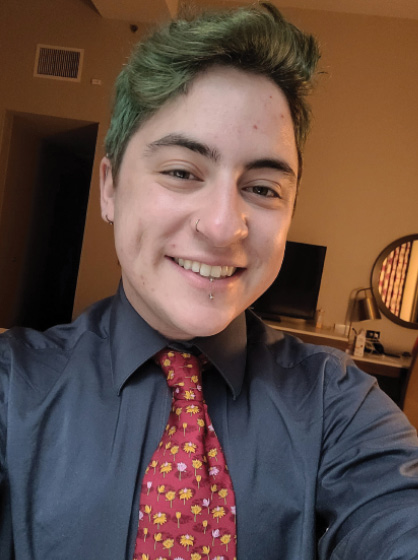When I was asked to create content for a multimedia online journal about the prairie region, as a STEM major through-and-through with little to no experience with non-academic writing, I knew immediately I was a fish out of water. However, it is a central tenet for Rootstalk that too-often-unheard voices have a place on its pages. As a queer scientist myself, I realized that this was a perfect opportunity for me to collect and tell the stories of queer scientists in the Midwest.
For context, I am a queer person from Mississippi, and as I write this I am in my last semester as a Psychology major with concentrations in Neuroscience and Linguistics. Most of my stress dreams these days are focused on the question of my future as an aspirational scientist. Additionally, when I began this article I had just passed six months since I started medically transitioning, so navigating that was another thing to consider as I began searching every job that seemed tolerable. As any overeager about-to-be-grad would do, I began to scour Reddit for anyone with with professional and personal experience even remotely comparable to mine, thinking I would ask them for advice. I came up completely short in just about every regard, though, further emphasizing the need for stories like mine.
My original idea was to cast a wide net, mostly using social media, and thinking I would highlight the experience of as many queer scientists from or in the Midwest as I could find. I immediately ran into trouble. Turns out, finding openly queer scientists is difficult anywhere, and even more so in the Midwest. I got a couple of responses to my queries, but in the event I could only arrange interviews with two scientists—Alex Keyes, a fifth-year graduate student in the pharmacology program at the University of Iowa, and Asia Perkins, a third-year PhD student in the clinical psychology program at the University of Connecticut. I continued to reach out even more openly to other queer scientists and was even less successful in arranging meetings.
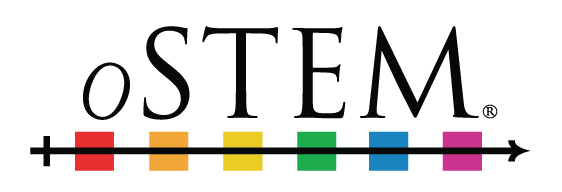
oSTEM (which stands for “out in Science, Technology, Engineering and Math”) is a non-profit professional society focused on supporting LGBT people in STEM careers. oSTEM has over 100 active chapters at colleges and universities, as well as in professional settings in both the U.S. and abroad. Logo courtesy of oSTEM.
I next thought about reaching out to undergraduate students as a different demographic. I searched for which Midwestern universities had an active chapter of oSTEM (“out in STEM,” an LGBT STEM organization) to contact students directly. However, oSTEM couldn’t really provide contact information, since insuring that everyone remains safe and in control of their own identities means discretion is a priority. From there, I individually contacted LGBT groups at major Midwestern universities to gauge interest in my project. Still, I got no responses.
I considered a couple other options: cast yet another even wider net with professors and other scientists to whom I hadn’t reached out to before, hoping that my luck would turn. Unfortunately, as my emails continued to go unanswered, I was reminded just how hard the next couple years would be as I continued through my daunting life transitions without the comfort of people who knew what I was going through. Furthermore, what could I write about? I began to consider giving up on the concept entirely. But then I realized that the difficulty of gathering the stories of LGBT scientists in the Midwest was, in fact, the story.
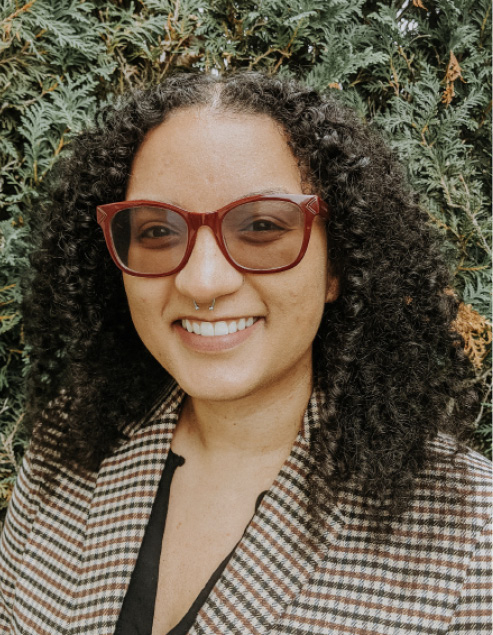
Asia Perkins, from Oklahoma, now a third-year PhD candidate at the University of Connecticut
Asia Perkins is a queer woman of color who grew up in Oklahoma. She earned her undergraduate degree in 2015 at the University of Oklahoma in Psychology and English Language and Literature. There, she noticed a lack of mental health resources, a lack of support for diverse populations, and general bigotry. Currently, she focuses primarily on the cause and identification of disruptive behavior disorders generally and how those disorders interact with psychopathic traits to impact development more specifically. Additionally, she studies the factors that influence racial and ethnic diagnostic disparities apparent in these disruptive behavior disorders, and how provider and teacher biases contribute to inaccurate and ineffective treatment recommendations.
When I asked about the most rewarding parts of her work with the children in her research and advocacy work struggling with these disorders, Perkins said, “I used to hear, ‘There’s nothing we can do for you. You’re always going to be this way. You’re probably going to end up in prison.’” Because this attitude was being imposed on impressionable children, Perkins felt called to find the intersection of her clinical and research work and childhood development. She uses her position as a queer woman of color to empathize with the position these children often from minority groups are put in and to intervene with appropriate support. Her empathy, informed by her own experiences with bigotry in the Midwest, shows these children that they are not lost causes, and that someone is willing to sit down and say, “Hey, I really care about you. I want to learn about you as an individual.” It’s this work that Perkins feels can make a huge difference. Perkins also helps these groups by working with the Connecticut Psychological Association and the American Psychological Association on behalf of high school kids. This work connects them with psychologists of color to support their growth in the classroom as well as potentially connecting them with psychology as a potential field of research.
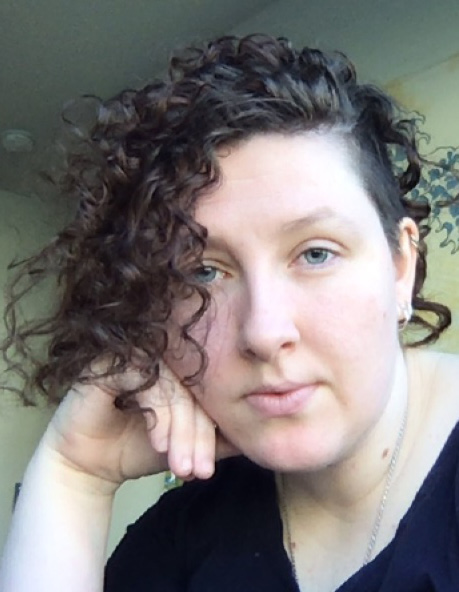
Alex Keyes, from Arizona, now a fifth-year PhD candidate at the University of Iowa
Alex Keyes grew up in Tucson, then attended college at Linfield University in Oregon, where they studied Chemistry and Biology. Keyes then moved to Iowa to attend graduate school in pharmacology at the University of Iowa.
Keyes’ research is in determining the role of neuro-immune interactions within the spinal cord in pain sensitization. This line of research has been a consistent interest of Keyes since they were 15. “I knew people that had severe chronic pain that current therapeutics couldn’t treat,” Keyes says, “There are people with chronic pain out there; approximately a third of the population has some form of chronic pain, and it needs a lot of addressing because there really isn’t a lot of good treatment out there.” As a disabled trans person, Keyes’ firmly believes that science should always be done at the guidance, and for the benefit, of those most affected by the subject being studies. They endeavor to support marginalized scientists and marginalized community voices in every area of science. This goal drives their passion in science communication online, as this mode of communication allows for those outside the field to have access to the information as well as furthering representation of their minority identities.
One of Keyes’s notable experiences was working informally on a YouTube video that was debunking the Wakefield vaccine hypothesis (which posits that vaccines lead to autism). “One of the things that I really want to work on is [promoting] science communication,” Keyes said. “Especially to people that have don’t have as much science background, got pushed out of the sciences, or, for whatever reason, didn’t have access to good science, education, anything like that.”
A common theme when I asked Perkins and Keyes about community and its importance was just how difficult it is to find and situate yourself in the queer science community or to find diverse representation. As Perkins said, “I hadn’t really noticed any decent representation until I got to grad school. I don’t think I had a single queer or, like, racially or ethnically minoritized psychology professor, or anyone to look up to when I was in college or younger.”
Coming from the Deep South, I had the impression that “at least the Midwest isn’t as conservative as the South,” so I was frankly surprised about what I was hearing as well as what I was not hearing. My top choice graduate program is at the University of Iowa, and I felt so excited at the prospect of joining that community. However, I was hearing that even in a place that has a progressive reputation, at least in terms of LGBT+ rights, there still isn’t a community.
One possible explanation is that the Midwest has a unique brand of bigotry. While places in the South are much more obvious about their bigotry, a lot of the problems in the Midwest are more covert. From vague comments about length of hair to assumptions about the gender of an alluded partner based on perceived gender of the speaker, it’s much smaller things that clue you in to the covert judgments constantly being made. Compared to slurs yelled out of pick-up trucks and overt violence that can be suffered merely walking down the street, these examples seem minor and not exactly newsworthy; however, these examples still make those impacted feel alienated and unsupported. So, the next question is why, in this supposedly progressive area, are people so bad at accepting LGBT+ identities?
Keyes made an excellent point about this problem: the Midwest is incredibly rural and spread apart. Even most of our metropolitan areas would barely be considered notable towns in the more populated coastal regions, and the space between the cities is almost entirely empty. Keyes says, “A lot of it out here in Iowa is genuinely just visibility, because most of the time, I’m the first trans grad student that people have come across.” Queer youth are not used to enough openly queer people being around to even begin to create a community. Add the STEM aspect, in which anything other than cisgender heterosexual, wealthy white men is still considered a minority, the possible community is even smaller. Even worse, those that have these queer identities may choose to “just stay in the closet” (which is painful in its own right), which even further lessens the visible community. This lack of visibility of your own identities makes it easy to feel like you just don’t belong in this space.
In response to Keyes’s point about this lack of representation, Perkins said, “I got to grad school, and it’s still not necessarily very diverse, but I know where to look now. I know who to talk to. And I know how to network, how to get connected and find the people who do share different aspects of my identities now. It’s just difficult because you have to find them and search for them.” Keyes further echoed this, noting that “it took until this year to work with an openly queer professor.”
Are Keyes and Perkins saying that I’m doomed to constantly search for a community which may or may not even stick? No, in fact they both have a lot of advice about how to find that community.
Both emphasized how important student connections are: senior peers, graduate students from interesting labs, even random students on social media. Peer connections are invaluable for finding others in the community. Both said how exciting it is to interact with those interested in their field. Keyes advised emailing current graduate students. “If there’s research you’re really interested in, email us,” they said. “We’d love to talk about our research. We’re generally open to cold emails.” Those connections more easily help find others that share identities, as, anecdotally, it only takes one person to introduce you to a community. Additionally, Perkins highlighted the task forces – nationally, regionally, and locally – that specialize in minority populations where you can find community.
Finding such a community may take work, but it is worth the effort. These communities are vital for combatting imposter syndrome, as minoritized populations much more often than others are more susceptible to believing they are not good enough and don’t belong in their space. As Perkins said, “if I didn’t find people who look like me and have been in the program or in the field, then it would have been rougher than it is. It is very, very important to find your people and find a sense of community. I cannot say or talk about that highly enough.” As she found her community related to both her racial and queer identities, she said “I found several communities where it feels so safe, it feels so warm.”
Minoritized populations in science aren’t important just for community. As Keyes said, “you realize that pain affects predominantly minoritized people… And usually, the more marginalized identities you hold, the higher risk you are for developing chronic pain. And so being able to find scholars that even look at that, or are part of those communities themselves, it helps in terms of advocacy work and what we are able to push for.” Further, Perkins said, “whatever background you have, if there’s research you’re passionate about, you can do it. Sometimes coming from a background of either your marginalized identities or just the classes you’ve taken, your education can really inform a perspective that is potentially course-changing for the research that you do.”
Despite the challenges I have described above, I want to emphasize that the effort it takes to make it into the science field is worth it. There are many obstacles, and we must support each other. Add in the imposter syndrome that many minority populations struggle with, and it truly is something to celebrate how we succeed despite the challenges finding our community. We may have to put a bit more elbow grease into it, and that can be discouraging, so I will end with a quote from Keyes on pushing through the discouragement:
“You are worthy of being there.”
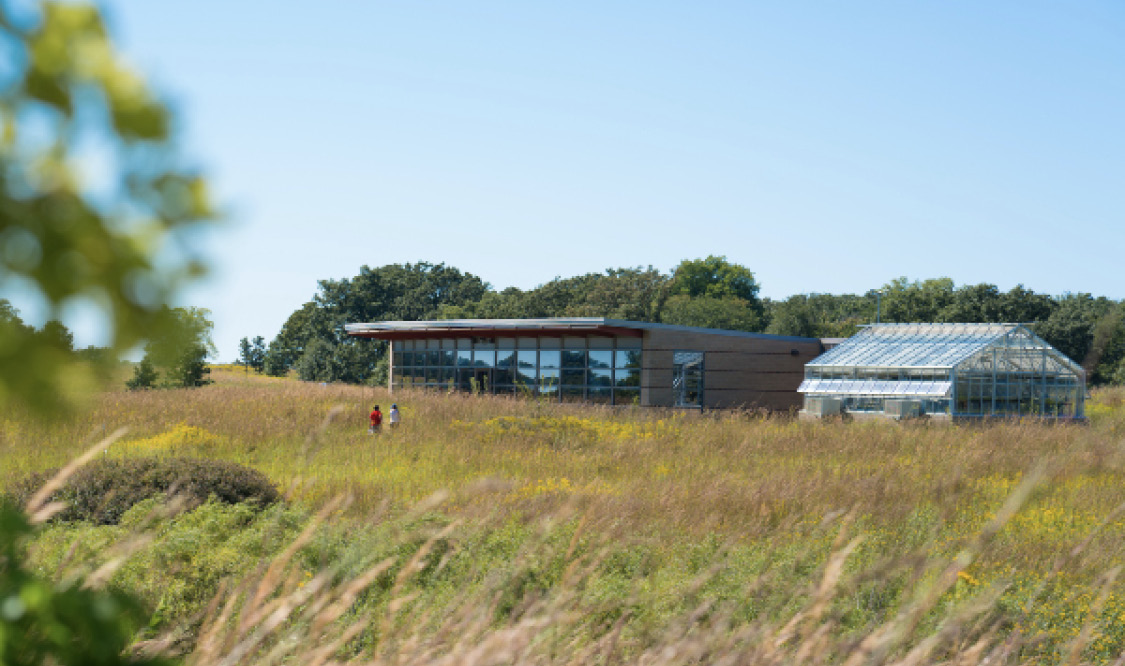
The combined laboratory, classroom and greenhouse at the Conard Environmental Research Area (CERA), Grinnell College’s state-of-the-art teaching facility for the environmental sciences, is the centerpiece of the College’s multi-year prairie restoration project


